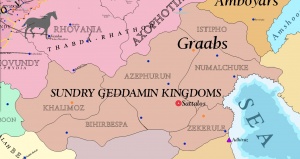Adamantine Geddamin
The cousins of the Gorcorumbese Geddamin are the giants of the Adamantine Mountains. Unlike the Gorcorumbese, the Adamantine Geddamin keep isolated in their mountains. They suffer from nearly continual internal struggles among their houses. Dwarven scholars propose that the deepearth below the mountains is embroiled in a multi-ethnic war of which the Geddamins' conflicts on the surface are only a skirmish. The Adamantine Giants rule nearly all the Adamantine Mountains save for the southwestern ranges which are under the control of the Zarajovenish Tribes.
The Adamantines have been allied with the Gorcorumbese, but do not possess the same level of titancraft technology as the Gorcorumbese Geddamin. The Auricians fear that the Adamantine giants may come up to some level of parity with Gorcorumbese technology. In some periods of the very ancient past, the Adamantine giants exacted tribute from the ancient city-states of Kalama. They were also a threat to human civilization during the Middle Ages of Chaos.

The six kingdoms of the Adamantine Giants are Azephurun, Istipho, Numalchuke, Zekerule, Bihirbespa, and Khalimoz.
History of the Adamantine Giants
The Adamantine Giants have dwelt in the mountains of their namesake for millennia, extending back to the time of the so-called titans, according to their legends.
Invasion of the Mountain Giants
In the forty third century (ca 4,400 AS to 4,300 AS), the Adamantine Giants were united under a powerful warlord who led them out of their mountain fastnesses to attack the City-States of Vimalia and Shelekhumbia. After a series of wars, the giants were expelled by the Hanumbasha Dynasty from Vimalia, and also separately from Shelekhumbia. Around this same time, the Esabdalites Tribes and early Thammazite Tribes were migrating from Weshif to the north. It is thought that these migrations were associated with climate change and related droughts and famines. At roughly the same time in Pytharnia, the Dzhehiu Dimak and the Coming of the Neptultchi were taking place.
See Also
| This article is a stub. It requires further development by the creator. |